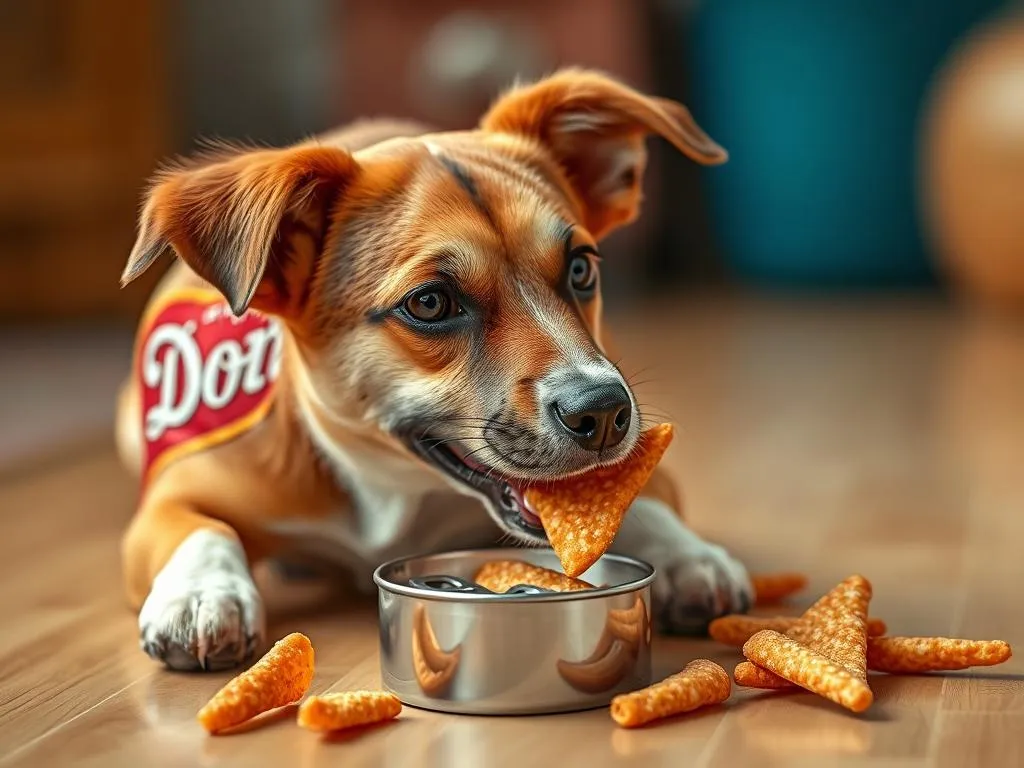
Introduction
Dog nutrition is a vital aspect of pet ownership that can significantly impact your dog’s health, behavior, and overall well-being. Understanding what your furry friend should eat is crucial, especially when it comes to the curiosity surrounding human foods. Many dog owners often wonder, can dogs eat Doritos? This popular snack may seem harmless, and the question arises often as we indulge in these treats ourselves. The purpose of this article is to explore the safety of Doritos for dogs and provide insights into proper dog nutrition.
Understanding Dog Nutrition
Essential Nutrients for Dogs
To comprehend whether human snacks like Doritos are suitable for dogs, we first need to understand what constitutes proper dog nutrition. Dogs require a balanced diet consisting of several essential nutrients:
-
Proteins: Essential for growth and repair of tissues, proteins are the building blocks of your dog’s body. They are vital for muscle development and overall health.
-
Carbohydrates: While dogs can derive energy from carbohydrates, their digestive systems are not as efficient at processing them as humans. However, moderate amounts of carbs can provide energy and aid in digestion.
-
Fats: Healthy fats are crucial for energy and the absorption of certain vitamins. They also contribute to a shiny coat and healthy skin.
-
Vitamins and Minerals: These nutrients support various bodily functions, from immune health to bone strength. A well-rounded diet ensures that dogs receive these essential vitamins and minerals.
Differences Between Dog and Human Nutrition
Understanding the differences between dog and human nutrition is essential for making informed dietary choices for your pet.
-
Digestive Systems: Dogs have shorter digestive tracts than humans, which means they process food differently. While humans can efficiently digest a variety of foods, dogs primarily thrive on a diet high in proteins and fats.
-
Nutritional Requirements: Dogs have unique nutritional needs that differ from humans. For example, dogs require specific amino acids and fatty acids that might not be as critical in human diets.
-
Common Human Foods that are Harmful to Dogs: Many human foods, such as chocolate, grapes, and onions, are toxic to dogs. It’s essential to be cautious about what human snacks your dog can safely consume.
Overview of Doritos
What are Doritos?
Doritos are a popular brand of flavored tortilla chips produced by Frito-Lay. Known for their crunchy texture and bold flavors, Doritos are often a go-to snack for many.
Ingredients and Nutritional Content
The main ingredients in Doritos typically include:
- Corn: The primary ingredient, providing the base for the chips.
- Vegetable Oil: Used for frying, which can add unnecessary fat.
- Cheese Powder: Adds flavor but can be high in sodium and fat.
- Seasonings: Various spices and flavorings, often high in salt and artificial additives.
Types of Doritos
Doritos come in a variety of flavors, including:
- Nacho Cheese
- Cool Ranch
- Spicy Nacho
- Salsa Verde
These additional flavorings can introduce more ingredients that may not be suitable for dogs.
Common Ingredients in Doritos
Corn is generally safe for dogs in moderation, but the other ingredients can pose risks. Let’s take a closer look at the potential concerns:
-
Cheese Powder: While cheese can be a treat for some dogs, the high fat and sodium content in cheese powder can lead to health issues.
-
Seasonings: Many Doritos contain spices and seasonings that can upset a dog’s stomach or, in some cases, be toxic.
-
Artificial Flavors and Preservatives: These additives can lead to allergies and other health issues in dogs.
Can Dogs Eat Doritos?
Assessing the Safety of Doritos for Dogs
When considering if dogs can eat Doritos, it is essential to analyze the ingredients. While a small piece might not harm your dog, the cumulative effects of regular consumption can be concerning.
-
Salt: Doritos are high in sodium, which can lead to excessive thirst, urination, and, in severe cases, sodium ion poisoning.
-
Fat: The high-fat content can contribute to obesity and pancreatitis, particularly in dogs prone to these conditions.
-
Artificial Additives: Ingredients like artificial flavors and preservatives can cause digestive issues and allergic reactions in sensitive dogs.
Short-Term Effects of Dogs Eating Doritos
If your dog manages to snatch a few Doritos, you may notice some short-term effects such as:
-
Digestive Upset: Symptoms may include vomiting or diarrhea due to the high fat and salt levels.
-
Lethargy: If a dog consumes a significant amount of Doritos, they may become lethargic or exhibit discomfort.
Long-Term Effects of Regular Consumption
While an occasional Dorito may not pose a significant risk, regular consumption can lead to serious health issues:
-
Obesity: High-calorie snacks contribute to weight gain, which can lead to obesity-related problems.
-
Heart Issues: Excessive salt and fat can increase the risk of heart disease.
-
Pancreatitis: A high-fat diet can lead to inflammation of the pancreas, a painful and serious condition.
Alternatives to Doritos for Dogs
Healthier Snack Options
If you’re looking for alternatives to Doritos, there are plenty of healthy snack options for dogs:
-
Dog-Friendly Treats: Many pet stores offer treats specifically designed for dogs, made with healthy ingredients.
-
Fruits and Vegetables: Certain fruits and vegetables can be excellent snacks. Safe options include carrots, apples (without seeds), and blueberries.
How to Make Dog-Friendly Snacks
Creating homemade dog treats can be a rewarding way to provide healthy snacks. Here are some simple recipes:
Peanut Butter Banana Treats
- Ingredients: 1 ripe banana, ½ cup peanut butter (unsweetened, xylitol-free), 1 cup oats.
- Instructions: Mash the banana and mix with peanut butter and oats. Form into small shapes and bake at 350°F for 15-20 minutes.
Sweet Potato Chews
- Ingredients: 1 sweet potato.
- Instructions: Slice the sweet potato into thin rounds and bake at 250°F for 2-3 hours until dried.
Tips on Ingredient Selection
When selecting ingredients for homemade dog treats, consider the following:
- Avoid harmful ingredients like chocolate, onions, and excessive salt.
- Use whole, natural ingredients whenever possible.
- Ensure that any fruits or vegetables are safe for canine consumption.
Signs Your Dog Has Had Too Much Junk Food
Common Symptoms of Digestive Issues
If your dog has indulged in too many unhealthy snacks, be on the lookout for symptoms such as:
- Vomiting: Can indicate digestive distress.
- Diarrhea: Loose stools can result from a sudden change in diet.
- Bloating: A swollen abdomen can be a sign of discomfort or more serious issues.
When to Consult a Veterinarian
If your dog exhibits severe symptoms or if you’re concerned about their health after consuming junk food, it’s crucial to consult a veterinarian. Warning signs that require professional attention include:
- Persistent vomiting or diarrhea.
- Signs of dehydration (excessive thirst, lethargy).
- Abdominal pain or swelling.
Conclusion
Maintaining a balanced diet for your dog is essential to their health and happiness. After exploring whether dogs can eat Doritos, it is clear that these snacks are not suitable for canine consumption. The high levels of salt, fat, and artificial additives can lead to various health risks, both in the short and long term. Therefore, it’s recommended to stick to dog-friendly snacks and treats to promote a healthier lifestyle for your furry friend.
FAQs About Dog Nutrition and Doritos
Can dogs have small amounts of Doritos?
While a small piece may not cause immediate harm, it’s not advisable to make it a habit due to the high salt and fat content.
What human foods are safe for dogs?
Safe human foods include plain cooked meats, certain fruits (like apples and blueberries), and vegetables (like carrots and green beans).
How can I know if a food is safe for my dog?
Always research human foods before offering them to your dog, and consult your veterinarian for personalized advice.
What should I do if my dog eats Doritos?
Monitor your dog for any adverse symptoms. If they show signs of distress or illness, consult your veterinarian immediately.









